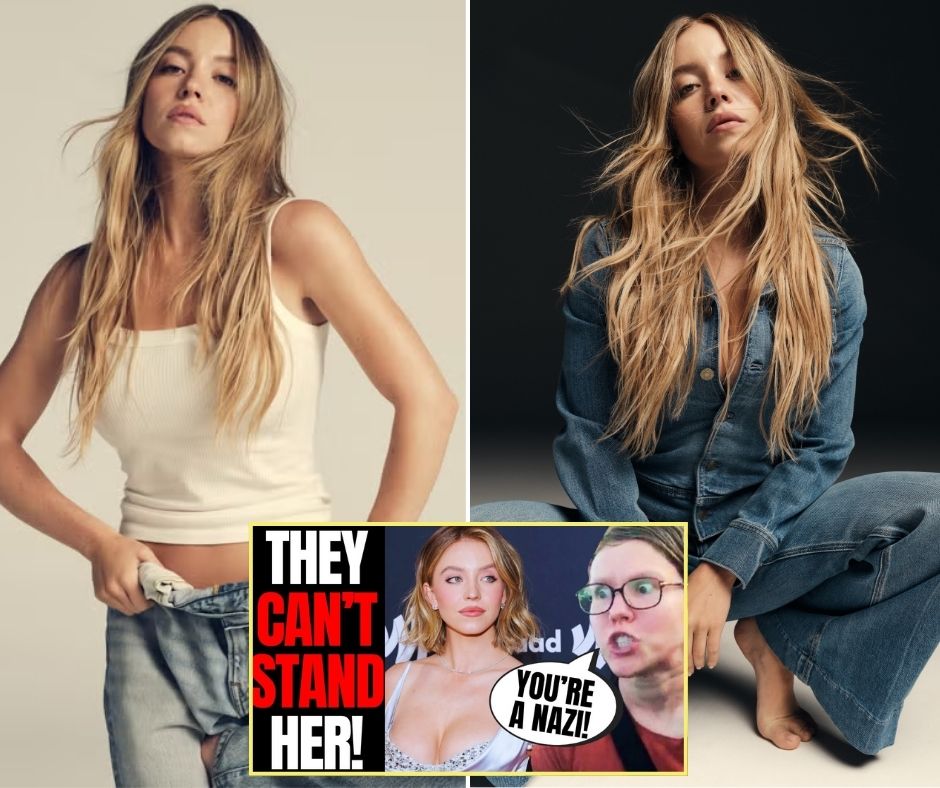🚨 Sydney Sweeney’s American Eagle ad has the internet in a FRENZY! 😱 Why are people calling a simple jeans campaign “Nazi propaganda”? Is it just a clever pun gone wrong, or is there something deeper at play? 🤔 The truth might shock you…

Introduction
In late July 2025, American Eagle launched a new fall campaign featuring actress Sydney Sweeney, titled “Sydney Sweeney Has Great Jeans.” What seemed like a playful, denim-focused advertisement quickly spiraled into a cultural lightning rod, igniting debates about race, eugenics, and the male gaze. Critics on social media platforms like TikTok, X, and Threads labeled the campaign as “Nazi propaganda” and “eugenics dog-whistling,” while others praised it for rejecting “woke” marketing trends. This article explores the origins of the controversy, the polarized reactions, and the broader cultural implications of this advertising misstep.
The Campaign: A Pun with Unintended Consequences
The American Eagle campaign centered on a simple wordplay: “jeans” versus “genes.” In one promotional video, Sweeney, a 27-year-old actress known for roles in Euphoria and The White Lotus, says, “Genes are passed down from parents to offspring, often determining traits like hair color, personality, and even eye color… my jeans are blue.” The camera pans to her blue eyes, and a voiceover declares, “Sydney Sweeney has great jeans.” Another ad features Sweeney painting over the word “genes” on a billboard to read “jeans,” reinforcing the pun. The campaign also included a limited-edition denim line, “The Sydney Jean,” with proceeds supporting Crisis Text Line, a mental health charity aiding domestic violence survivors.
On the surface, the campaign aimed to capitalize on Sweeney’s star power and all-American charm. With her blonde hair, blue eyes, and girl-next-door persona, she embodied a retro, Americana aesthetic. American Eagle’s Chief Marketing Officer, Craig Brommers, called Sweeney “the biggest get in the history of our brand,” signaling a shift to a celebrity-driven marketing strategy. The campaign’s nostalgic vibe, reminiscent of 1980s Calvin Klein ads featuring Brooke Shields, was meant to evoke playfulness and sexiness. However, the execution—particularly the focus on “genes” and Sweeney’s stereotypically “Aryan” features—struck a nerve in a politically charged climate.
The Backlash: Accusations of Eugenics and Nazism
Almost immediately after the campaign’s launch on July 24, 2025, social media erupted with criticism. Users on TikTok, X, and Threads accused the ad of promoting eugenics and white supremacy through its “great genes” messaging. A viral TikTok by user @midwesterngothic called the ad “fascist weird, like Nazi propaganda weird,” pointing to Sweeney’s blonde hair and blue eyes as a deliberate nod to idealized white beauty standards. On X, user @davejr307 tweeted, “Maybe I’m too fucking woke. But getting a blue-eyed, blonde, white woman and focusing your campaign around her having perfect genetics feels weird, especially considering the current state of America,” garnering over 5,000 likes. Another post on Threads declared, “The new American Eagle Ad with Sydney Sweeney? That’s Eugenics. Nazi propaganda. And it’s BLATANT.”
The accusations stem from the historical context of eugenics, a debunked pseudoscience that promoted selective breeding to “improve” human populations, often tied to white supremacist ideologies. The Nazis infamously used eugenics to justify their “master race” propaganda, celebrating traits like blonde hair and blue eyes. Critics argued that American Eagle’s wordplay, paired with Sweeney’s appearance, evoked these troubling connotations, especially in a time of heightened political polarization. Some pointed to the brand’s name, “American Eagle,” as amplifying the perceived nationalism, with one TikTok user stating, “Should we be surprised that a brand named American Eagle is making fascist propaganda like this?”
Additionally, the campaign drew parallels to Brooke Shields’ 1980 Calvin Klein ads, which also used a jeans/genes pun. Shields, then 15, faced criticism for the sexualization in those ads, and some saw Sweeney’s campaign as a tone-deaf homage. Commenters on TikTok noted the “disrespectful” reference to Shields’ controversial past, with @midewesterngothic asking, “Why are we referencing that? I thought we agreed that was weird.”
The Defense: A Clever Pun or Rage Bait?
Not everyone saw the campaign as sinister. Supporters argued it was a harmless, cheeky pun, not a coded message. On X, @uncledoomer wrote, “Why is everybody suddenly pretending ‘good genes’ is about eugenics when it very obviously means ‘big huge breasts’?” The post received over 740,000 views, reflecting a sentiment that critics were overanalyzing a straightforward ad. Another user commented, “Woke advertising is dead. Sydney Sweeney killed it,” praising the campaign for rejecting inclusive marketing trends in favor of traditional beauty standards.
Advertising expert Toni Ferrara, quoted in Sourcing Journal, defended the campaign, noting that the jeans/genes pun has been used before, such as Gap’s “Good Genes Run in the Family” slogan in the 2000s, without similar backlash. “It’s cheeky, not sinister,” Ferrara said. Others suggested the controversy was deliberate “rage bait” to boost engagement, pointing to American Eagle’s stock surge of up to 16% following the campaign’s launch. The stock spike, driven by retail traders on platforms like Reddit and Stocktwits, suggested the controversy had turned American Eagle into a “meme stock,” akin to GameStop.
Sweeney’s fans also rushed to her defense, arguing she was unfairly targeted. One X user wrote, “I’ve never seen so many people actively try to hate on a woman enjoying her run and career. B-tches be hating.” Others highlighted Sweeney’s transparency about taking brand deals to support her career in an industry with declining residuals, as she told The Sun in 2022.
Cultural Context: A Polarized Landscape
The controversy reflects broader cultural tensions in 2025 America. The rise of conservative aesthetics, like the “tradwife” lifestyle and “old money” fashion, has clashed with progressive calls for inclusivity. Sweeney, already a polarizing figure due to past controversies—like her 2022 family party with “Blue Lives Matter” attire—has become a lightning rod for these debates. Her unapologetic embrace of her sex appeal and traditional beauty standards has made her a hero to some on the right, who see her as a counterpoint to “woke” culture, and a target for those on the left, who view her image as reinforcing exclusionary ideals.
The campaign’s focus on the “male gaze” further fueled criticism. Videos showing Sweeney buttoning her jeans while the camera pans to her cleavage or posing seductively were called out for oversexualization. One Reddit user commented, “The ad feels like a 2000s casting-couch fantasy, not a 2025 denim campaign.” Critics argued that the campaign prioritized male viewers over female consumers, who are American Eagle’s primary demographic.
American Eagle and Sweeney’s Silence
As of July 29, 2025, neither American Eagle nor Sweeney has publicly addressed the backlash. Some videos from the campaign have been removed from the brand’s official channels, though they persist on platforms like Reddit and X. The silence has only amplified speculation, with some accusing the brand of intentionally courting controversy for attention. The Washington Post noted that the campaign’s financial success—evidenced by the stock surge—suggests that “all publicity is good publicity.”
Implications for Advertising and Culture
The Sydney Sweeney American Eagle controversy underscores the challenges brands face in navigating a hyper-polarized cultural landscape. What was intended as a nostalgic, playful campaign became a flashpoint for debates about race, beauty standards, and corporate responsibility. Professor Robin Landa, in Newsweek, warned that “careless wordplay in advertising can help normalize exclusionary beliefs,” highlighting the need for brands to vet creative through a modern lens.
The backlash also raises questions about media literacy and outrage culture. While some criticisms may overreach—equating a jeans ad to Nazi propaganda—others reflect genuine concerns about subtle messaging in a time of rising nationalism. The campaign’s success, despite the controversy, suggests that provocation remains a powerful marketing tool, even at the cost of alienating some consumers.
Conclusion
The Sydney Sweeney American Eagle ad controversy is a case study in how a seemingly innocuous campaign can ignite a cultural firestorm. The jeans/genes pun, paired with Sweeney’s image and the brand’s Americana branding, touched on sensitive issues of race, beauty, and ideology. While supporters see it as a clever marketing move, critics view it as a tone-deaf misstep with harmful implications. As brands continue to navigate these turbulent waters, the incident serves as a reminder that words, images, and context matter—especially when they echo historical wounds. For now, the debate rages on, with American Eagle reaping the financial rewards and Sweeney remaining at the center of a polarized cultural divide.





